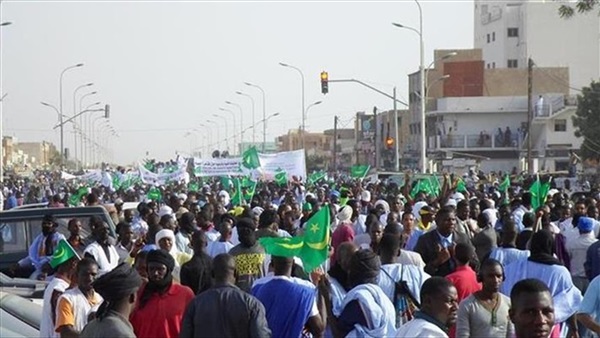Africa is revolting against Ankara’s interventions, Mauritanians reject Turkish support for the Brotherhood

On Friday, September 4, 2020, hundreds of citizens
gathered in front of the Turkish embassy in the Mauritanian capital Nouakchott,
condemning Ankara's interventions in Africa.
The demonstrators demanded the necessity of stopping
Turkey's interference in the internal affairs of Africa.
They also issued a statement confirming that the
days showed the malicious intentions of the Turks, stressing that they seek to
destroy and destroy the world.
The statement said: Mauritanians gathered today in
front of the Turkish embassy; Objection to the recent Turkish interventions in
Africa in each of the following countries (Libya, Mauritania, Tunisia, etc.)
and also because of its continuous support for extremism and terrorism, in
addition to supporting the Muslim Brotherhood, which is classified as a
terrorist group.
The statement added, In this regard, we call for an
urgent and unconditional end to the plundering and plundering of wealth, and to
interfere in the internal affairs of African countries, and to stop supporting
extremist groups, parties and militias.
Turkey began to search for influence in Turkey early
on through charitable work and aid distribution, which the Mauritanian
government sensed the danger since 2016.
Nouakchott had granted a license to open the
"Burj Al Alam" schools of the service movement led by the Turkish
preacher and thinker "Fethullah Gulen" in mid-2004, and
"Gulen" schools remained the only representative of Turkish diplomacy
in Mauritania until 2011, the date of the opening of the first Turkish embassy
in Nouakchott. .
At the end of 2016, the Turkish government made an
official request to Mauritania to hand over a number of Gulen supporters to
accuse them of the failed coup attempt, as Turkey pressured Nouakchott to
withdraw licenses, close schools, and hand them over to the Turkish embassy.
The Mauritanian government responded in 2018 to
withdrawing the licenses of Gulen schools and transferring their ownership to
Mauritanian businessmen, without harming their staff, a number of whom had
benefited from the right of political asylum in Mauritania.
In early 2018, the Mauritanian government felt the
danger of the Turkish infiltration, with the country's former president,
Mohamed Ould Abdel Aziz, designating the Brotherhood as a terrorist group.
In January 2020, the "Arab African Center for
Development in Mauritania" organized a symposium entitled "Foreign
Interventions in the Arab World ... Turkish Intervention in Libya as a
Model", in which a large number of media professionals and jurists
participated, in conjunction with the launch of the activities of the
"Peace in Libya" conference in the German capital. Berlin.
The participants criticized Turkey's interventions
in the Arab region, especially its military intervention in Libya, and
emphasized that it destabilizes security and stability, and reflects its
expansionist ambitions in Africa.
During the symposium, Ahmed Salem Ould Dah, Director
of the Center and the Syndicate of Mauritanian Journalists, said: Turkey’s
intervention in Libya came to meet the expansionist ambitions of the Turkish
government, calling on Libyans to miss the opportunity for these intentions, to
sit at the dialogue table, and to reject division.
Meanwhile, the Mauritanian writer and political
analyst, "Pope Ould El-Tarad," said that the slogans of freedom have
become a pretext to perpetuate and legalize foreign interference in the Arab
region, pointing out that these slogans were used on a large scale by various
campaigns of the colonialists in various periods.
"Ould Al-Tarad" stressed that what the
region is exposed to can only be described as "neo-colonialism,"
referring to the Turkish intervention in Libya.
For his part, the Mauritanian writer and political
analyst, Mustafa Muhammad Al-Mukhtar, held the terrorist Brotherhood
organization responsible for the Turkish military intervention in Libya.
He added that the Brotherhood does not value their
homelands as much as the interest of the international organization and the
realization of its agendas, even if they are at the expense of the
self-interest of this or that Arab country.
The Mauritanian writer and political analyst pointed
to the danger of the media arms that justify the Turkish military intervention
in Libya, and their hijacking of the minds of many young people and emerging
generations.





